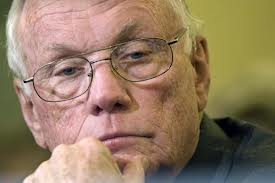NEIL ARMSTRONG AND THE CHESAPEAKE BAY
Neil Armstrong’s uncommon biography is common knowledge now that he has passed. Sadly he is numbered among my growing list of persons I understand better after the posthumous recollections are synthesized and disseminated; better than before he died.
I saw that first step on the moon. It was magical to imagine what that moment was like for the first man to leave a human footprint there. Like many, I was inspired to explore, and simply to appreciate the accomplishment, and the nation that came together to make this possibility real.
We know that soon after this trip to the moon, Neil Armstrong led what many consider to be a quiet life. He shared his knowledge of aerospace engineering as a professor at the University of Cincinnati. He served on several aerospace corporate boards, and helped investigate the Challenger shuttle disaster.
Armstrong went to the moon. He had the backing of a nation, the encouragement of the world. I must ask, was his life after coming home from the moon too quiet? Another Neil (Degrasse Tyson, of the Hayden Planetarium) observed this morning on NPR that humans have not left low earth orbit in forty years. Should our first man to step on another heavenly body have denied himself the more peaceful life, and raised the Congressional roof insisting we continue reaching outward, ever onward into space? We cannot say. To second guess a hero might be unfair, and even dangerous. Armstrong did try to defend our nation’s next space effort, the Constellation Program, before Congress, but only after the Obama administration canceled it.
http://www.enjoyspace.com/en/short-news/neil-armstrong-defends-constellation
Would we have gone forty years, and now perhaps even longer, without more distant travel from Earth, if these astronauts had been more outspoken about consolidating our gains and pressing forward all along? Perhaps the fact that the Constellation Program was on the books led us all into complacency that we would soon be on the path to deeper space.
We fly in aircrafts, go to space in spacecrafts, and only hear about small crafts when advised by authorities that weather or pollution makes it dangerous to go out on the water.
I believe we explore on our boats. We might not gaze with the first human eyes on the wonders of the Chesapeake Bay when we take to our vessels. On a molecular level, at least, the waters we ply are renewed with every passing instant by the rivers that constantly feed the Bay. With these cruises, we can introduce our friends and our families to the unfamiliar. On our boats we separate ourselves from the rest of the world. Surely there is rescue if our journey meets with misadventure, but it could be hours before we see a helping hand reaching toward us in our distress. We know from Apollo 13 that NASA has helpful suggestions and insights if a spacecraft meets with trouble, but the Agency cannot offer much more. The astronauts went to the moon on faith in the men and women who built their ships, and perhaps also with faith in the loving embrace of the Divine.
Listen to me. Next time you take to the water, remember that this act is what led us to go to the moon; the urge to see what is over yonder, and no matter whether our home is good or repellant. We go to our craft, cast off, cut ourselves free of the familiar and the predictable, and look forward to new spaces; perhaps we look more deeply into ourselves. I invite you one night to look up from your deck to the moon, and you will see the fine thread that connects your bow to the Sea of Tranquility.
As an explorer, please make another connection to your representatives in Congress. Even if there is human space flight slated in the budget, make some noise to assure the plans are not thrown aside for anything less than our very best, our very finest inspiration to carry on. Help keep the promise Neil Armstrong and his moon voyaging brothers made to us. Perhaps to a fault, they always put the mission first over their own vainglory. We must shout with these old men to preserve a vision that leads ever farther from home.
http://ow.ly/dgeRy Ship Picture Credit by Armadacon
http://ow.ly/dggEd Cliff Owen/AP/File Christian Science Monitor

